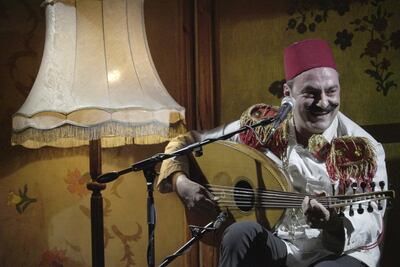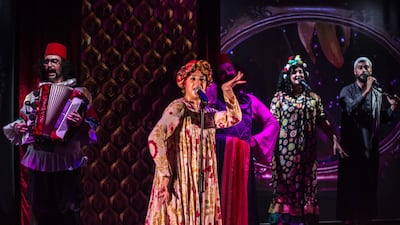Here's a tip for anyone who wants to visit Beirut's cult theatre company Metro Al Madina: make sure the taxi driver is very specific when pointing out the entrance.
The venue is located underneath a set of stairs in an anonymous-looking building in the bustling Al Hamra district. Once you find the door and descend, you're transported from the gritty realities of modern-day Beirut to the golden age of Egyptian cinema.
I step on to the chequered linoleum floor of the welcome lounge, where a jukebox blasts out vintage funk tunes. Red lights shine on an eclectic clientele: I spot an overdressed woman in a gown fit for the theatre; there are a couple of male rockers sporting well-worn leather jackets; and, sitting on a stool besides the bar, there's an older, dapper gentleman wearing a bow tie and braces with his suit.
Week after week, the show is sold out. The evening I go is no different – there are roughly 150 of us waiting to be ushered to our seats in front of the small stage that plays host to the Hishik Bishik Show, one of Beirut's most successful independent cabaret affairs.
The show has run weekly for the past six years. It has beguiled Middle Eastern culture-lovers across generations with its witty and quirky take on songs from the golden age of Egyptian cinema.
Despite its reverential love for a time gone by, the show is not schmaltzy at all. A transgressive spirit runs through the two-hour production that, in hindsight, has always infused the plots of those hallowed films it references.
The nine performers on stage are nameless characters, archetypes from that period. There are two female singers, one a sassy and classy teacher or socialite, the other a humble yet vivacious beauty from the underclass. There is a conservative zealot, a zany-yet-lonely barman, a misunderstood belly-dancer and a forlorn street musician backed by his three-piece band.
The stage is split into two static sets: stage left is where the band plays in what resembles a cafe, while on the other side is a bar with a few stools.
The actors come in and out from behind a papered wall in the middle.
They all perform more than a dozen classic songs from that period, ranging from jaunty folk anthems and classic balladry to Sufi-esque hymns.
A show for everyone
While some of the tracks are immediately recognisable – such as the sweet children's ballad Dahab Al Lail Tala' Al Fajr from the 1956 drama Miracle from Heaven, the charming Ewa Tkalemni from the 1962 film Between Two Mansions and the swooning Ya Kharija Min Bab Al Alham from the 1946 comedy The Lady's Puppet – many are relatively obscure.
And that's the point: this is not a karaoke performance, after all. Instead, the show gives a grateful nod to a time when musicianship in the Arab world was viewed as more than only a matter of entertainment.
“Many of these films have a special place in the hearts of people,” Yasmina Fayed, who plays the socialite, tells me backstage before the show.
"And this is one of the reasons why they come to the show. But since we are more about performances of the songs in those films, as opposed to recreating scenes, once they see the show they actually appreciate the power of the music. What the Hishik Bishik Show does, I believe, is show people how that period was an amazing time when it comes to the quality of singers, compositions and poets." It was a similar discussion that originally sparked the idea for the Hishik Bishik Show back in 2013.
Metro Al Madina was a burgeoning theatre company at the time, and was looking for a new concept to bring to the stage. It was going to be something fun, musical and engaging – and it was only meant to run for about a week.

Once the topic was decided, the whole team researched hundreds of films from which they chose the key songs to perform. "We started with the songs first," Fayed says. "This led to the movies that we knew and they led to films that we didn't know.
“I felt like I was studying, but [it was] more exciting.”
It took only the first couple of shows for word to spread. Before long, the season was sold out, and the show has run every week since – with the odd break in between.
Fayed has a theory as to the continued success: “What happens is that young people see the show first and then they invite their parents and they then bring their friends and it goes on.”
Uncompromising excellence
Where Fayed, as an accomplished and trained actor, focused on nailing the subtlety of her character, Ziad El Ahmadie practised the songs.
That's not surprising as, on top of playing the role of street singer in the show, he's also its musical director.
“It was difficult, because you have to remember that these songs were originally composed and recorded with an orchestra,” he says. “And in our show we only have four instruments.
“The way that we worked it out is that the oud and the violin would play the melody, the accordion provides the harmony and the percussion gives us the rhythm.” The reason these songs have endured, El Ahmadie says, is because of the importance the Egyptian authorities, at the time, gave to the arts.
“As the leaders of cinema production at the time, the cultural ministry had the best film and recording studios and they hired exceptional musicians and composers,” he says.
"You had people used to listening to hour-long and complex compositions, from great singers like Umm Kulthum and Mohammed Abdel Wahab, at home or in concert.
“So what they managed to do for the films was to compose short songs without losing the complexity and depth of what people were accustomed to.”
Read More
• The heir to the oud dynasty: Omar Bashir
• Inside the trend of Arabic pop stars dedicating songs to their children
• Mohammed Assaf says Saudi Arabian live market is a boon for singers
When it comes to the Hishik Bishik Show's growing acclaim – which has even seen the troupe travel internationally, to Egypt in 2015 and Belgium two years later – both El Ahmadie and Fayed reject the suggestion that it could be partly down to the production reminding audiences of a more peaceful time in the region.
“We never really thought of it like that, to be honest,” El Ahmadie interjects. “Politics has nothing to do with it.
"Our show delivers a message that during that time in Arab history there were amazing songs by talented people, some famous and some forgotten."
Fayed concurs. “It is also about providing options to people today,” she says. “Especially here in Beirut.
“People now know that if they want to hear good music performed live they can come and see us.”
Hishik Bishik Show is performed at Metro Al Madina, Beirut, Lebanon. For details go to www.metromadina.com


